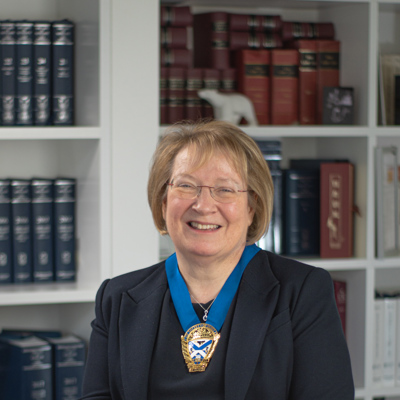Protecting the independence of the legal profession
I’m delighted to have been invited to join such an esteemed panel considering such an important subject, not only for our profession but for the proper functioning of thriving, modern societies. Thank you for the opportunity to share Scotland’s perspective, and hopefully secure your support for our current challenges.
Solicitors in Scotland are as committed to the independence of the legal profession as our colleagues anywhere else – indeed, I think it’s part of the reason why the law is more than just a profession – but until quite recently we were maybe also a little complacent about the local relevance of a topic even as important as this one.
Coming as we do in Scotland from a well-respected legal system that’s developed over centuries in an established democracy, we’d perhaps have seen ourselves as more of a positive example for others.
Instead, Scotland is sadly at the moment a prime example of why we must never, never be complacent about the rule of law and the independence of the legal profession from those who it is charged with holding to account.
That’s because of a piece of legislation currently before the Scottish Parliament in Edinburgh, the Regulation of Legal Services Bill.
This Bill proposes to give Scottish Ministers new powers to intervene directly in the regulation of the legal profession for the first time. Such power over solicitors and advocates would be unlike anything we’ve seen in other western democracies.
In a free and democratic nation, solicitors are often responsible for challenging excessive use of government power or defending their clients against prosecution from the state. It is essential that they can act freely, with no risk of government interference. That is why the independence of the legal profession is such an important principle in any democracy.
It’s not just the Law Society of Scotland raising the alarm. The Faculty of Advocates, Scotland’s judges and many legal experts along with our colleagues at the International Bar Association agree with us that this imposition of executive power on the legal sector must not proceed.
The Bill could see the Government intervene directly on the rules and structures that decide who can and cannot be a solicitor, decide the professional requirements placed upon solicitors, and decide the way in which legal firms operate.
Section 49 of the Bill would also allow the Scottish Government to appoint itself as a direct authorisation body or regulator of legal businesses. It opens the prospect, one never before suggested, that the state could regulate law firms directly.
I’m not suggesting for a minute that the Scottish Government in proposing this change has nefarious intentions. But legislation must be analysed and challenged based on how that law could be used and misused in practice, not just on the intentions behind it.
Not only would this Bill in its current form damage the global reputation of our justice sector, it would make Scotland a less attractive jurisdiction in which to do business. A stable political system including an independent legal system is good for society and good for business.
That brings us to the global context. Of course there are far graver risks to the rule of law than this in other places. But that’s exactly why it would be such a travesty if autocratic regimes in other parts of the world could use Scotland as an excuse to justify similar or worse controls on lawyers in their own countries.
The Law Society of Scotland has a long history of standing in solidarity with our colleagues elsewhere who face egregious restrictions and persecution. We support international efforts to bolster the rule of law and the independence of the profession, even more so with the realisation that our legal system also stands to benefit.
We live in a time where international laws and norms are being challenged, as has been vividly illustrated by Russia’s illegal invasion of Ukraine. These standards are critical to the stability of the international order we currently have.
Words alone from lawyers around the world do have power. I’ve mentioned already the IBA’s submission to the Scottish Government spelling out how its proposal is viewed outside of Scotland. Similarly, a declaration signed in Goa from the Commonwealth Bar Leaders earlier this year clearly stated the importance of an independent legal profession and judiciary.
There’s similarly still powerful resonance in the Basic Principles on the Role of Lawyers that I believe has been circulated to you all, adopted by the UN Congress on the Prevention of Crime and the Treatment of Offenders well over 20 years ago.
That we are still making the same arguments even domestically shows that we have perhaps not made the progress that those authors would have hoped for.
On that basis, I don’t believe we should be relying entirely on words when there are better options available, even in cases such as ours where it appears the threat to our independence is likely the result of oversight or indifference rather than malice or calculation.
So, on the question of whether there should be a binding legal instrument internationally to protect the independence of the legal profession, our answer would be a resounding yes.
The Law Society of Scotland alongside our colleagues in England and Wales have been keen to play our part in the CCBE’s work towards a draft Convention on the protection of the profession of lawyer.
As you’ve heard from Panagiotis, this is not a simple task but progress is being made.
If we are to have a binding legal instrument, it must be absolutely watertight. Because we can be sure that some will seek to exploit any weakness or inconsistency. I’d hate to see an attack on legal independence justified on the basis that it complied with the Convention.
It must cover not just the worst threats to lawyers, but all points on what’s often a slippery slope from being a jurisdiction where the rule of law is sacrosanct to one where power and injustice go unchallenged.
We share the CCBE’s hopes, and those of the Council of Europe, that the Convention can become an international model for how to safeguard the rule of law.
Thank you for your time. I look forward to hearing the perspective from our colleagues in Ghana and Hong Kong, and considering how we can support them and lawyers everywhere seeking to work in the public interest without unreasonable political interference.

Regulation of Legal Services Bill proposals
The Society has said that Scottish Government proposals in the Regulation of Legal Service (Scotland) Bill which threaten independence of Scottish legal sector “are dangerous and wrong, and must be dropped”

